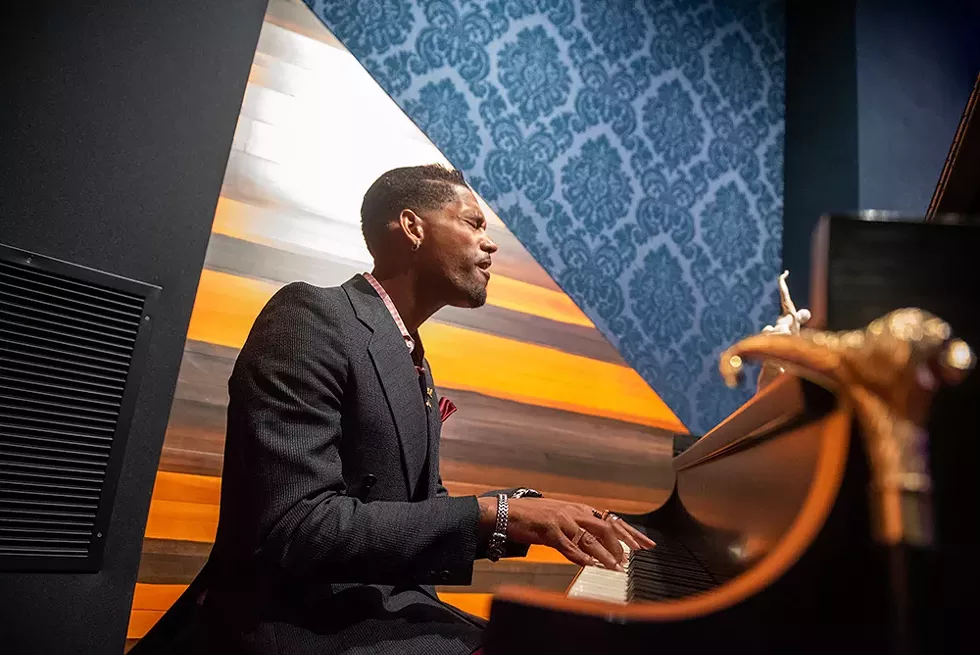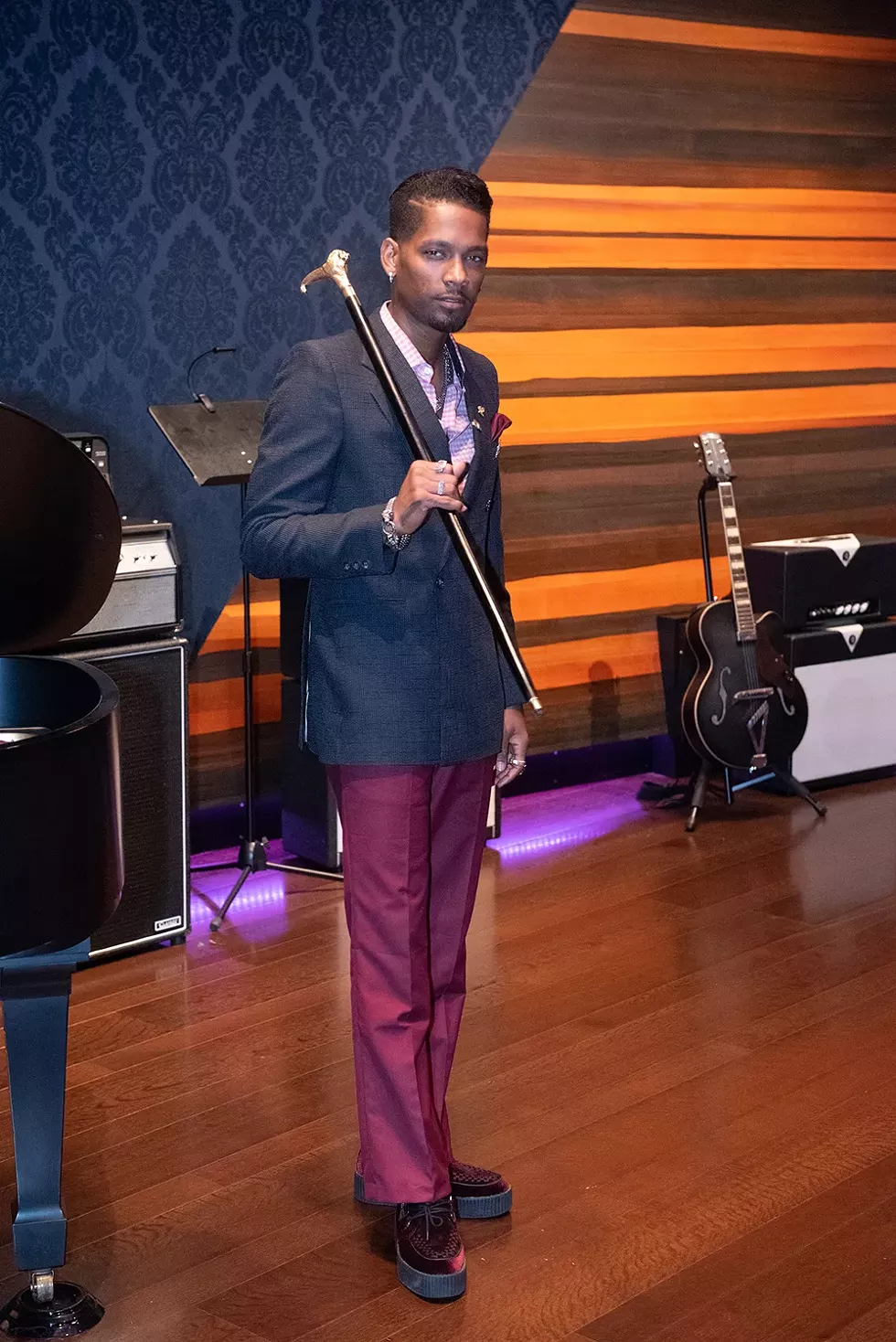It’s a rare quiet evening within the walls of the illustrious Royal House Recording studio in Royal Oak. The six-year-old studio has seen a strong surge in sessions since the start of the unexpected COVID lockdowns.
Manager Brandon Suwinski is flipping on lights and checking his phone. “We’ve been booked through the whole pandemic, people had extra money I guess,” he says with a shrug. He’s awaiting the arrival of singer and songwriter Drey Skonie, who works as an engineer for the studio.
Several minutes later Skonie darts in wearing signs of frustration like a punctured quilt. He vents for a few minutes about having to break into his own house after he locked his keys inside. He takes off his coat, flops down on a stool, rests his signature cane on the counter, and shakes off the bad energy.
“They opened the studio up today just for me,” Skonie says as he glances toward Suwinski. “It’s not a lot of people they would have done that for.”
Skonie has been riding a rising wave of likes, spins, streams, and overall interests as more people have been diving into his musical catalog and current content. His latest single, “Rolling Skone,” produced by Nick Speed, is an uptempo house music remake of the Temptations’ classic, “Papa Was a Rolling Stone.”
“One day Nick was like, ‘Why am I the only person in Detroit that doesn’t have a song with you?’” Skonie says. “So I was thinking Temptations, trying to bring back that Marvin [Gaye] vibe, and he cooked something up.”
Born Lewis Andrew Jackson, the Detroit native grew up singing, playing piano, percussions, and drums at his family's church Maranatha Temple before secular music snatched him away. “I wanted to be Michael Jackson. My family told me not to, but I did it anyway,” Skonie says with a smile.
After a family disagreement, Skonie dropped out of Thurston High School and moved to Chicago. “I got robbed and I told my family, but they didn’t believe me so I just left,” he says. “It was some runaway from home type shit.” Skonie then moved in with his uncle and spent the next few years in Chicago’s local music scene.
“I was always active,” he says. “I had equipment in my room. I was working with this guy named Amadeus, he had me come out to Foster Park. He would hold auditions and talent shows.”
Amadeus urged the then-21-year-old singer to audition for the fourth season of Sean “Diddy” Combs’s reality show Making the Band that aired on MTV. Skonie took his advice, sang his ass off at the audition, and was chosen by judges Mike Bivens and Slam to join the cast in 2007.
“It was a life-changing moment to be honest with you. I truly couldn’t believe it,” Skonie says. The timing of the opportunity was crucial as Skonie and his girlfriend at the time were preparing for the birth of their daughter Amaya. However, taking part in the show would mean that Skonie would have to move to New York.
“My baby moms didn’t want me to go. She told me if I go, then don’t come back. I went anyway,” he says while shaking his head. “I’m still paying for that decision.”
Skonie made his presence known as Making the Band was MTV’s most-watched show. This was back when MTV was the go-to network for reality shows and Making The Band season four was already out-performing previous seasons. Skonie’s raw talent, Detroit hustle, and a little Chicago charisma made him an instant fan favorite.
“I went from 500 friends on MySpace to 50,000 overnight,” he says.
Skonie survived several challenges, including Diddy’s famed cheesecake walk, in which the rap mogul makes the cast walk five miles to get him a slice of cheesecake.
“You gotta think about stuff people really go through to make it in this business. That’s what he was really trying to teach us,” Skonie humbly says.
Ultimately, Diddy dismissed Skonie in dramatic fashion midway through the season. Skonie admits he didn’t see it coming, but he’s learned that's the ups and downs of show business.
“I’m not going to say I was the most talented, but nobody expected me to get kicked off,” he says. “Some things are just for entertainment.”
As a free agent, Skonie packaged up his newfound celebrity status, moved to Atlanta, and joined the R&B group Kwiet Storm on Jonnetta Patton’s JPat Records imprint. Patton had been credited with her son Usher Raymond’s success — yes, that Usher — so the move seemed like a good one. Kwiet Storm was the typical urban pop boy group, and Skonie and Patton had them performing regularly in more than 120 cities.
“We were getting shopped around for a distribution deal,” Skonie says. “Walmart wanted to sign us to an exclusive deal. The only problem was they wanted Usher too, but Usher would have never signed a deal like that. He didn’t have to.”
After some internal strife, the group asked Patton to be released from JPat.
“They kinda held us in that contract, which caused us to miss out on a potential deal with Jive records,” he says. “But when Bieber walked through their door, they forgot all about us. But I really can’t say anything bad about [Patton]. Me and her still have a good relationship.”
In 2012 Skonie felt it was time to return back to the roots of his identity and his music, and moved back to Detroit to regroup and reassess his career.
Skonie pauses, contemplating his words. “Through the Making the Band and Kwiet Storm I was always listening to everybody else and not listening to myself,” he says. “All the music I grew up on, I wasn’t using it. I had stopped playing instruments. When I came back to Detroit I wanted to find my sound.”
Skonie wasted no time making his presence known in Detroit’s music scene again. He lent his vocals to Shorty da Prince in a “Lotus Flower Bomb” remix, dropped a fire hook on one-time Shady recording artist Obie Trice’s “Spend the Day,” and released a litany of singles, covers, and videos. He wrote songs for Omarian, and Jacques, there were sit-downs with Universal Music and Def Jam, and he made it to the third round of The Voice auditions, in which he was flown to California in 2015.
But for all the good music and hustle, he just couldn’t get to that next tier of success. It was almost like it was there, but it wasn’t there. Eventually, doubt set in.
“I felt it,” he says. “I’d be lying if I told you every day I didn’t want to quit. I can’t give up, I just feel like I gotta keep going. I was so close I could smell it. Having a kid will put a lot of pressure on you. I’m her hero, she knows that I’ve been on TV, she tells people her dad is famous.”
During the pandemic, Skonie caught lightning in a bottle when social media influencer Natalie Bebko used Skonie’s “Bad for Me” single for her viral dance challenge. “I got a ton of new flowers and that motivated me to keep putting out new content,” Skonie says. “That’s how I survived the pandemic.”
Skonie believes that the next level of success is still coming, but he’s confident that he can do it without reality shows or betraying his sound. “I’m a mixture of trap soul and I damn near want to say pop,” he says. “I’m blessed. I’ve been able to stay true to the core sound of my voice. The records I’ve had that did good had that. If I keep trying to sound like Trey Songz or Chris Brown, I’m probably not going to make it. I’m back to my roots.”
Skonie will perform on Thursday, Nov. 18 (his birthday) at the Hotel St. Regis, 3071 E. Grand Blvd., Detroit; 313-873-3000. Show starts at 8 p.m. Tickets are $10.
Stay connected with Detroit Metro Times. Subscribe to our newsletters, and follow us on Google News, Apple News, Twitter, Facebook, Instagram, or Reddit.



